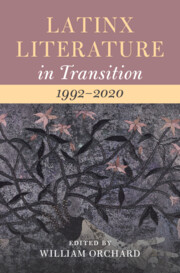Book contents
- Latinx Literature in Transition, 1992–2020
- Latinx Literature In Transition
- Latinx Literature in Transition, 1992–2020
- Copyright page
- Contents
- Contributors
- Acknowledgments
- Introduction
- Part I Shifting Coordinates
- Part II Transforming Genres
- Part III Emerging Media
- Part IV Theoretical Turns
- Chapter 17 AfroLatina Embodied Archives of Knowledge Production
- Chapter 18 Contemporary Latinx Indigeneities
- Chapter 19 Cruising Utopia and the Queering of Latinx Literature
- Chapter 20 The Formal Turn in Latinx Literature and Criticism
- Bibliography
- Index
- References
Chapter 17 - AfroLatina Embodied Archives of Knowledge Production
from Part IV - Theoretical Turns
Published online by Cambridge University Press: 19 June 2025
- Latinx Literature in Transition, 1992–2020
- Latinx Literature In Transition
- Latinx Literature in Transition, 1992–2020
- Copyright page
- Contents
- Contributors
- Acknowledgments
- Introduction
- Part I Shifting Coordinates
- Part II Transforming Genres
- Part III Emerging Media
- Part IV Theoretical Turns
- Chapter 17 AfroLatina Embodied Archives of Knowledge Production
- Chapter 18 Contemporary Latinx Indigeneities
- Chapter 19 Cruising Utopia and the Queering of Latinx Literature
- Chapter 20 The Formal Turn in Latinx Literature and Criticism
- Bibliography
- Index
- References
Summary
Novels by AfroDominican writers like Loida Maritza Pérez and Nelly Rosario center the embodied archive as an epistemological site. As Afro-Caribbean feminist philosopher Jacqui Alexander reminds us, “So much of how we remember is embodied: the scent of home: of fresh-baked bread; of newly grated coconut stewed with spice (we never called it cinnamon), nutmeg, and bay leaf from the tree.... Violence can also become embodied, that violation of sex and spirit.” To echo Alexander, we can understand our bodies as archives where the records of multiple translocations, transformations, and the violence done to us are kept. The chapter proposes that in this same way, we can understand an AfroLatina embodied archive at the intersections of race, gender, sexuality, class, and transnational migration as a site of knowledge production. The chapter argues that bodies and archival memory are linked to form an embodied archive where memories are kept. The body becomes the place in which experiences are recorded and engrained. This knowledge is often passed on to future generations and creates new AfroLatina feminist knowledges of being, belonging, and self-knowing.
Information
- Type
- Chapter
- Information
- Latinx Literature in Transition, 1992–2020 , pp. 317 - 332Publisher: Cambridge University PressPrint publication year: 2025
